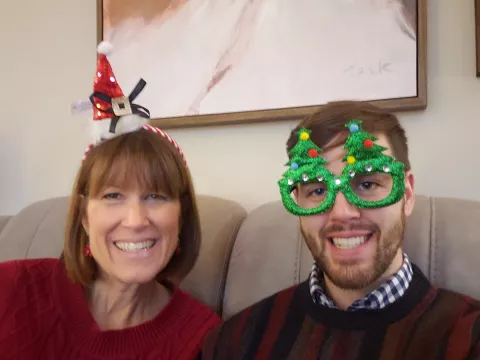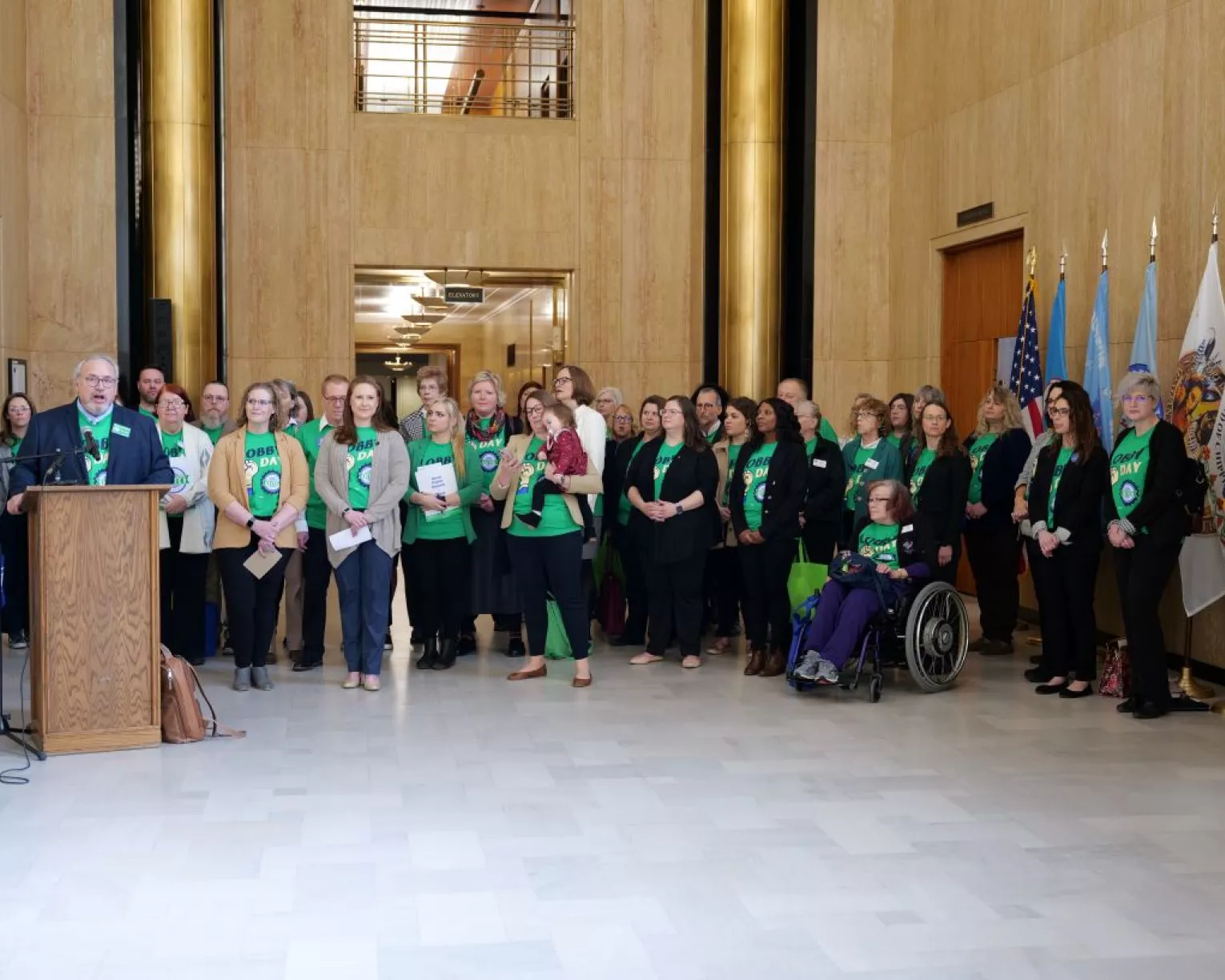Sometimes being a kid in school is hard. It can feel like wearing a big scratchy sweater, one you would never have chosen. You are told to sit in your chair, listen, focus — it pushes up against what feels natural but all the other kids seem to know what to do, how to act, how to organize their desks and backpacks, how to make friends. Did they get some special rule book that you didn’t? At home, or in extra-curriculars, the scratchy sweater falls to the floor, suddenly forgotten; in its place, your imagination soars, your curiosity expands. You make giant soap bubbles with a massive lollipop-shaped wand, you grow multi-hued crystals from all but nothing, you build, you tinker, you experiment … one idea pushes against the next.

For Justin Lafond, now a young man in his late 20s, having attention-deficit/hyperactivity disorder (ADHD) made life in and outside of school seemingly different worlds. Academics came incredibly easily to him, especially math, but he couldn’t get his assignments in on time, his desk was a wasteland, and most everything felt like having to juggle too many balls — they’re up, they’re down, then — how did this happen? — they’re scattered around his feet. He simply felt different. But outside of school he could plunge into his interests with joyful abandon.
My own world
“I was sort of in my own world till about middle school,” says Justin. “I think I was kind of a weird kid. I had different interests from a lot of my peers. And frankly, I always had an easier time talking to adults than kids. And I was bullied a lot, which exacerbated that feeling of being different. Not sure the bullying came from having ADHD or just because I didn’t fit in. Maybe both, but either way it was painful.”
Justin was not formally diagnosed with ADHD until he was in fourth grade. He does remember being tested prior to that but more for being a high-performing student. He tested off the charts in most subjects, especially math. He also had the vocabulary of a college student and used to keep a notebook of words he liked. “I do remember being in meetings, though, with my teachers and parents for not being the most attentive in class, for sometimes being disruptive. And as I got older, the meetings focused more on my being disorganized, my executive functioning issues,” he says. “My report cards would invariably arrive home with A, A, A but the comments section would focus on my lack of organization and my disruptive conduct.”
The fact is that Justin got bored in school. He caught onto the lessons quickly and effortlessly and while his peers needed time to catch up, he got bored and fidgety. He would dig around for more information on his own or try to do other things even if that involved twirling a rubberized ruler around and around. “Some of those meetings involved teachers saying that I needed to sit in the back of the room if I was going to twirl a ruler over and over since it distracted the other kids.”
Once he was officially diagnosed with ADHD, his mother, Susan Lafond, a long-time educator, took it upon herself to communicate regularly with Justin’s teachers, trying on some level to partner with them to find strategies that best benefited her son and his educators.
“My mother — a categorical list maker herself — helped me more than I can say. She instilled in me a lot of the tools and strategies that I still use today like taking notes, making to-do lists, setting priorities,” says Justin. As for his teachers, despite their best efforts, most of them did not offer him accommodation or suggest blueprints for how to better organize, stay focused, or relate in class with his peers.
What ADHD feels like
“As a kid, ADHD felt like there was a joke that I was not in on, or a rule book I hadn’t received. I would watch my classmates, baffled as to how they were able to juggle everything, how they could organize their work and pass it in on time, pay attention, and on top of all that laugh and riff and just understand each other socially,” says Justin. “Sometimes I felt overwhelmed trying to meet expectations. I imagine most people with ADHD just feel different. Not sure how to quantify it, especially when you are young and on top of that entering into puberty, but it was a feeling of things just not clicking.
“Had I been in a more supportive environment — and supportive not just ADHD-wise, but supportive for each particular child, for every kind of learner — I think I would have had a different experience. And had I been surrounded by kids with more like-minded interests and teachers who understood neurodiversity a bit better, I think I would have had a different experience. I battled depression, especially around fifth grade, a particularly dark time before I started to get medicated, because I feel like I sort of came into that cognition. You start to go through puberty, you grow up a little bit and things start making a little bit more sense, but at the same time, they make less sense.”
Justin started on low dosages of ADHD medications. He did not notice immediate changes, but he says he remembers being very excited that the meds might help him get over some of the problems he was having.
As for what ADHD feels like as an adult, Justin says, “Now, I know what I’m supposed to be doing but still there can be a complete disconnect between what I know I should be doing and what I want to be doing and can do. That can be difficult to grapple with because sometimes it can feel like I’m choosing not to be productive — or almost as if my mind is betraying me. And that disconnect can set in motion more cycles of anxiety and depression.”
Still now, Justin says ADHD medications help a great deal but he and his doctors are always fiddling with them to get the dosage right. “You get older, your body changes, and the research grows,” he says. “It’s easy to be over- or under-medicated.”
Finding music
“The social aspects of elementary and middle school were the hardest for me for sure. Anything below high school was definitely a struggle. But over the years, comparing notes with others, I realize more and more that middle school is pretty terrible for everyone,” he laughs sardonically.
What saved Justin on many levels in high school was music. A viola player, he found kids he got and who got him. There was camaraderie and friendship without the effort. And his orchestra teacher, from seventh through twelve grades, as well as a private music teacher recognized his passion and helped him find a home in music. “I felt like they recognized the potential in me, the willingness to learn and grow,” he says. “My orchestra teacher gave us so many cool opportunities to foster our musical interests; he took the time to care for us, encourage us. It was freeing and compassionate. I will always be grateful to both of them.”
Although Justin didn’t turn his love of music into a career nor does he actively play now, he says a lot of his friends are or were musical or creative types. “There’s a focus and a discipline in music that I bring to my life now, and my friends have that, too.”
The power of hyperfocus
While still in high school, Justin says one of his best coping mechanisms, or strategies, was to stay after school to focus on his homework. This was not always easy because, like many high school students, he was involved in loads of extra-curricular activities — from chamber orchestra and varsity volleyball to Boy Scouts and various clubs and events. But between school and most of those activities, Justin was able to find a space to get his work done. It was important to him to keep the workload of school separate from home as much as possible.
Being able to do one thing at a time, to focus solely on that one assignment, task, or job, has been crucial for Justin — back in school, in college, and now at work.
“I think my one of my greatest strengths is my ability to hyperfocus, which I think may be part and parcel with having ADHD,” says Justin who in four instead of five years completed his undergraduate degree in Neuroscience and his master’s in Biological Science at Binghamton University. “I can’t really juggle or remember a lot of things all at once, but the flip side of that means that I can really hone in on one thing. And my curiosity about that one thing results in my diving deeply into that subject. In college that meant doing laboratory investigations where I was doing incredible amounts of deep diving for research papers. And now in my job, I do investigations for financial crime and fraud in the gaming industry.”
Work/life balance
Currently, in his job doing research investigation into crime and fraud around sports betting and casino gambling, Justin laughs that he tells people that “he stalks rich people for a living.” His friends and family understand why for him, his job is “an absolute blast.”
“I have no background in finance whatsoever, but having been in science, I can now use my science skills — and my hyperfocus — which in many ways fostered a sort of research investigation background that is particularly useful in my role.” He can’t share any details about his clients or cases, but says, “We’ve seen some very, very major exciting things and I think what keeps the work interesting for me is that it brings together science and research but also stories and detective work. It unites my science and creative sides.”
What has also helped Justin succeed at work is finding a true work/life balance. “In some ways, I consider myself as having two personalities. I have my during the day/work personality, and then I have my after-work personality. For me, I need a strong separation between work and life. I think part of that need is due to the ADHD medication I take because it does wear off at a certain time. If you take it early, then it’s not going to last that late. But the balance also has allowed me to have some mental cleansing. I don’t get too stressed. When I have too much on my plate, I can feel overwhelmed. And that can lead to a lot of depression and shutting down and burnout. Having the set work time and then the set after-work/life time has been extremely helpful for me. Drawing that line between the two started in high school, like making sure I got my homework done during study hall before my activities, before I got home. It’s a skill and strategy that continues to work well for me.”
Advantages of ADHD
As it turns out, for Justin, many of the perceived challenges or weaknesses from ADHD have turned into strengths — and sometimes these strengths are ones other people don’t have like hyperfocus. “Also, experiencing my share of difficulties at a very early age taught me how to deal with challenges, especially from a mental health/emotional standpoint,” he says. “When things get hectic, they don’t phase me that much. I’ve had practice. I’ve been there, done that. And as it turns out, lots of the skills and strategies I had to start building as a little kid just to get by like note taking and making clear to-do lists have proved to be essential life skills. Having gotten into the habit of doing those things at a much younger age as well as developing a deep drive to do well, I started my career with a lot of skills that other people normally take a good deal longer to develop.”
Advice for kids with ADHD
“What would I tell kids who are struggling with ADHD? I would say that they’re not alone, and that it will all get better. Really. Your work will pay off; your struggles will not be for nothing. And eventually, you will find people who you connect with … there is a world of different and wonderful people out there and you don’t need to change to fit into anyone else’s world. For a long time, I felt like having ADHD was an extra hurdle I needed to jump over before I got up to the same playing field as everybody else. But now, I realize that ADHD is part of who I am, it makes me unique and gives me my own set of skills and pitfalls. I also think it’s important to refer to your ADHD as a learning difference, not a learning disability. That’s a huge shift in perspective for kids, parents, and teachers. Our brains just work differently, plain and simple.”
Already a Member?


